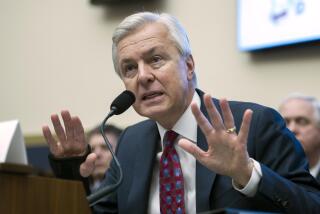Fannie, Freddie Armed for a Fight
- Share via
When Treasury Secretary John Snow called on Congress in September to create a “world-class” regulator to crack down on Fannie Mae and Freddie Mac, the two largest buyers of U.S. home mortgages were ready.
Between them, Fannie Mae and Freddie Mac had hired 46 lobbying firms in the first half of 2003, including seven of the 20 largest, to reinforce their permanent staffs. They spent at least $9.7 million on lobbying during that time, more than any other company or association, according to PoliticalMoneyLine.com, a nonpartisan group tracking such funds.
It wasn’t just the numbers, it was the names. Among other recruits, Freddie Mac took on Patrick Cave after he resigned last January as a top official in the Treasury Department division that’s seeking authority over the companies. It hired Terry Haines after he quit that same month as staff director for the House Financial Services Committee, which is considering the legislation.
The companies “are in a class by themselves,” with the most potent lobbying force in Washington, said Sen. John Sununu (R-N.H.). Sununu co-sponsored a bill that would strengthen oversight, in response to accounting errors that led to a $5-billion profit restatement by Freddie Mac last year.
The lobbying effort paid off. A month after Snow’s Sept. 10 testimony, the House Financial Services Committee indefinitely postponed a vote on a bill that would have allowed the Treasury Department to oversee new business, capital standards and other aspects of what Snow calls the companies’ “safety and soundness.”
For the Bush administration, that delay underlined its warning that without stricter supervision the companies might threaten U.S. financial stability because of their vulnerability to interest rate shifts and their combined $1.75-trillion debt. They own or guarantee 42% of the $7-trillion U.S. mortgage market.
“It’s important to have a regulator that is strong, capable and competent and able to deal with the risks they could present,” Snow said.
The shareholder-owned companies, chartered by Congress to increase financing for housing, buy mortgages from banks with proceeds from bond sales. They profit from the difference between their debt costs and the return on their mortgage holdings.
They lobby so hard because they “owe their very life to Congress,” said Jonathan Koppell, a professor at the Yale School of Management.
Congress has exempted Fannie Mae and Freddie Mac from state and local taxes and authorized the Treasury Department to buy $2.25 billion of their securities in the event of possible default. That “implied guarantee” allows the mortgage buyers to hold down annual funding costs by more than $15 billion, Congressional Budget Office Director Douglas Holtz-Eakin told the Senate Banking Committee in October.
The crackdown gained momentum in Congress last January when Freddie Mac, the smaller of the two companies, disclosed that it needed to restate earnings. Months later, the company said it underreported income for 2000-02 to hide earnings volatility. That prompted a $125-million fine by the Office of Federal Housing Enterprise Oversight, the companies’ regulator.
In October, Fannie Mae disclosed a $1.1-billion accounting error in its third-quarter earnings statement.
Fannie Mae and Freddie Mac sought to fend off a congressional backlash by “moving into full-bore opposition” to regulatory changes, said Rep. Richard H. Baker, (R-La.), a senior member of the Financial Services Committee.
They rallied the National Assn. of Homebuilders, the National Assn. of Realtors and other groups that profit from expanded mortgage finance, Baker said.
The Fannie Mae Foundation in 2002 gave $38 million to more than 1,000 affordable-housing associations, including $700,000 to the Local Initiatives Support Corp., a nonprofit group that seeks to revive low-income neighborhoods.
The companies “manipulated” the Financial Services Committee, said Rep. Christopher Shays (R-Conn.), another committee member. They use such tactics as paying firms not to lobby against them, Shays said.
Cave, Haines and other lobbyists declined to comment.
Freddie Mac spokeswoman Sharon McHale said Freddie Mac was “very well outgunned” and would have to vie for lawmakers’ attention against more powerful rivals.
More to Read
Inside the business of entertainment
The Wide Shot brings you news, analysis and insights on everything from streaming wars to production — and what it all means for the future.
You may occasionally receive promotional content from the Los Angeles Times.










